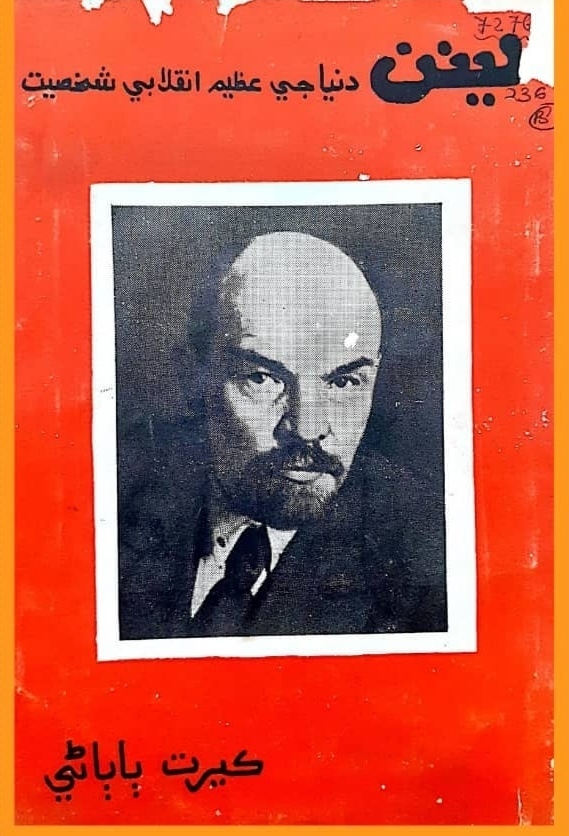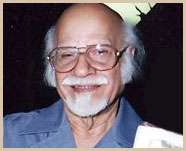
When the flames of WW-I were just weakening and fight for independence was simmering, a nondescript village Moro Lakho of Sindh witnessed birth of a boy on January 3, 1922, who would become a celebrated Sindhi writer
The flames of First World War were just weakening and the fight for independence in India was simmering slowly and gradually, when a nondescript village Moro Lakho of District Nawabshah, Sindh, witnessed birth of a boy on January 3, 1922, in the house of Choithram Babani, who would become a celebrated Sindhi writer, named Kirat Babani. Interestingly, Kirat took his initial education from a local Maulvi. Suddenly a catastrophe fell upon young Kirat, when at the age of four he lost his father. Though he was not capable of grasping the severity of his father’s demise, he cried just because others were also doing so. His mother tried to console him at that time.
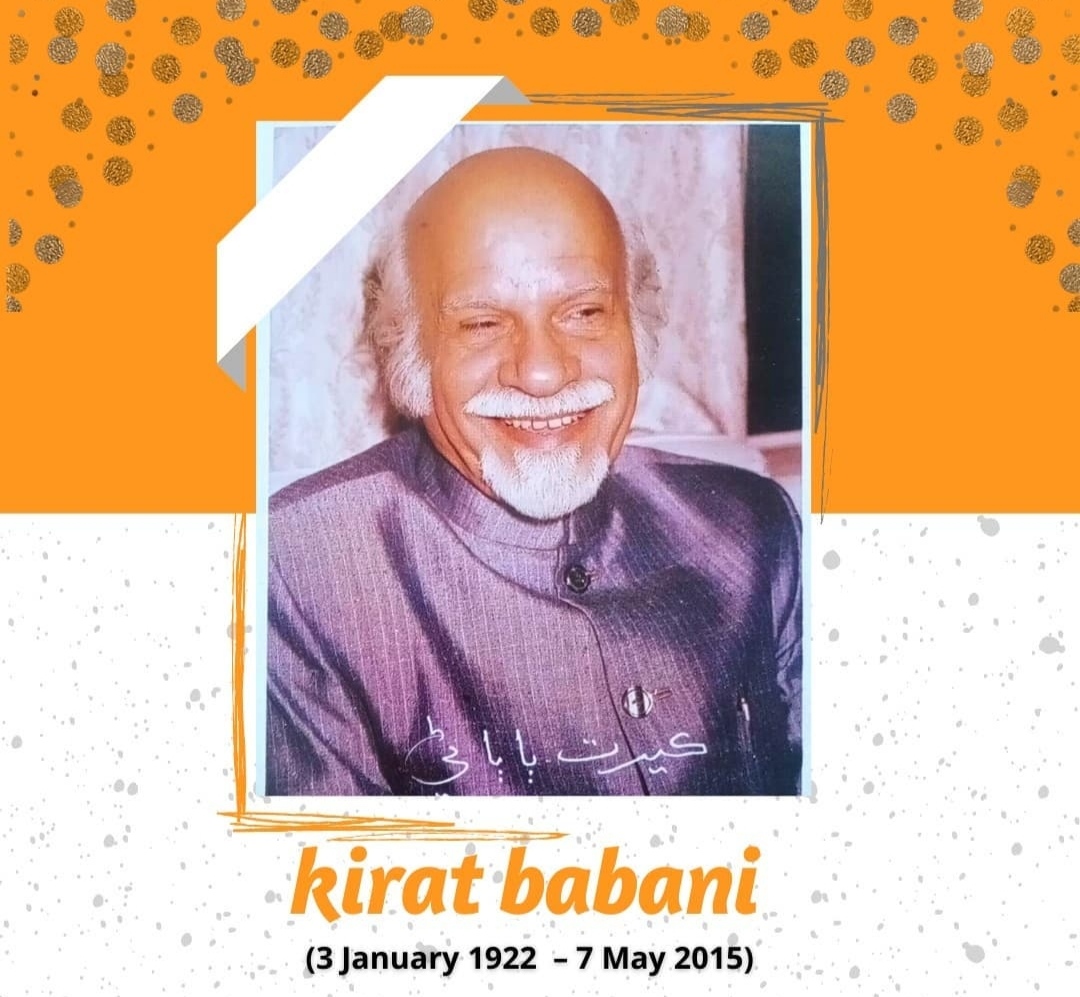 The turn of the events compelled his family to shift its base from that village to another village, Saboo Rahoo and ultimately they settled down in the city of Nawabshah. He was admitted to Wills High School, Soni Bazar, for his primary education and his hard work saw him donning the mantle of class–monitor, continuously from standard V upto XI. He was fortunate enough to get Mr. Rochiram Thawani as class teacher, in standard VIII, who always remained a guiding force in his life. It was Rochiram Thawani, who pumped patriotism into the veins of Kirat Babani at that tender age, which led him to become a leader of like-inded students. Kirat began wearing khadi clothes. He took active interest in school games, like cricket, volleyball, P.T., scouting etc. and also dabbled in school drama under the guidance of his science teacher Assandas Bijlani. He played the part of an old man in a drama titled ‘Podhe jo Parno’, where his enthusiastic rendering of a song on the stage saw his dhoti (loincloth) coming down. The scene provided ample opportunities for audience to laugh at this wardrobe malfunction.
The turn of the events compelled his family to shift its base from that village to another village, Saboo Rahoo and ultimately they settled down in the city of Nawabshah. He was admitted to Wills High School, Soni Bazar, for his primary education and his hard work saw him donning the mantle of class–monitor, continuously from standard V upto XI. He was fortunate enough to get Mr. Rochiram Thawani as class teacher, in standard VIII, who always remained a guiding force in his life. It was Rochiram Thawani, who pumped patriotism into the veins of Kirat Babani at that tender age, which led him to become a leader of like-inded students. Kirat began wearing khadi clothes. He took active interest in school games, like cricket, volleyball, P.T., scouting etc. and also dabbled in school drama under the guidance of his science teacher Assandas Bijlani. He played the part of an old man in a drama titled ‘Podhe jo Parno’, where his enthusiastic rendering of a song on the stage saw his dhoti (loincloth) coming down. The scene provided ample opportunities for audience to laugh at this wardrobe malfunction.
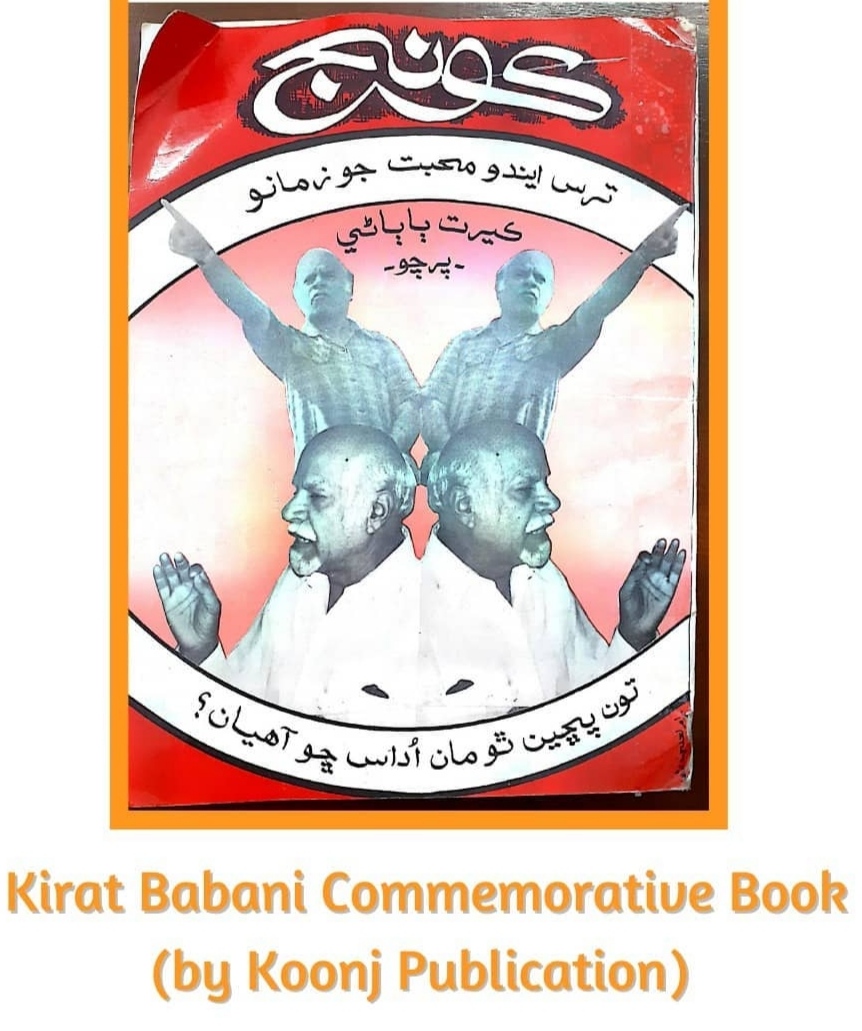 The spark of patriotism grew bigger and bigger into young Kirat Babani, as he constituted ‘Forward Students Union’ in the association of few like-minded students. He was studying in Matric, when Mahatma Gandhi issued a call for British to ‘Quit India’ in 1942. This move prompted India’s British Govt. to put all prominent Congress leaders behind bars. Kirat Babani also led a grand rally of students through the roads of Nawabshah, which ended at Gol Bazar where he delivered a spirited address to his fellow students. Local police came into action, few political leaders were rounded up and though Kirat Babani evaded his arrest for ten days but eventually he was picked up by the police and put at Nawabshah sub-jail, where he had to remain for ten months.
The spark of patriotism grew bigger and bigger into young Kirat Babani, as he constituted ‘Forward Students Union’ in the association of few like-minded students. He was studying in Matric, when Mahatma Gandhi issued a call for British to ‘Quit India’ in 1942. This move prompted India’s British Govt. to put all prominent Congress leaders behind bars. Kirat Babani also led a grand rally of students through the roads of Nawabshah, which ended at Gol Bazar where he delivered a spirited address to his fellow students. Local police came into action, few political leaders were rounded up and though Kirat Babani evaded his arrest for ten days but eventually he was picked up by the police and put at Nawabshah sub-jail, where he had to remain for ten months.
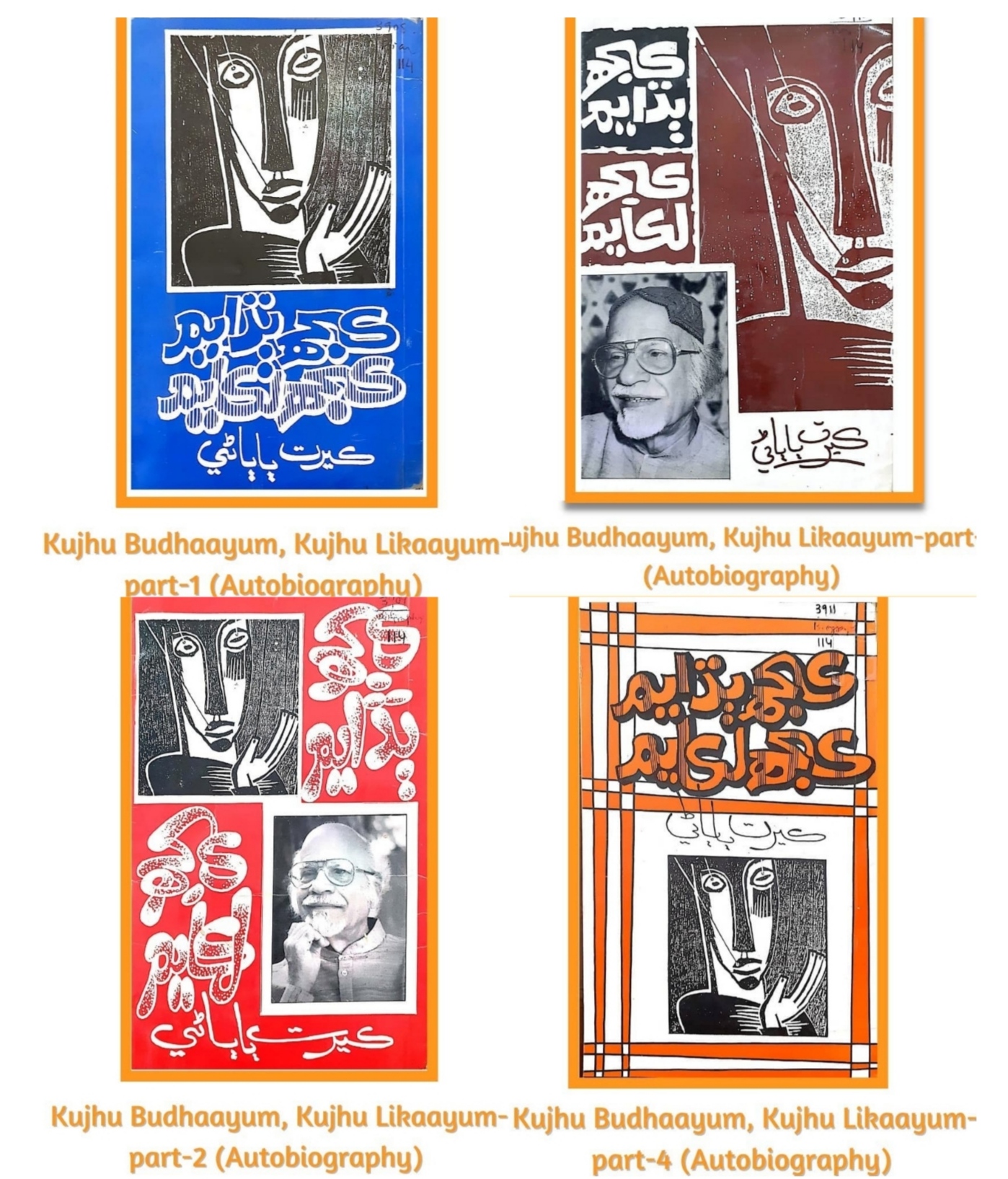 Even remaining behind the bars for two months, couldn’t subdue his penchant for independence. Again, he began his activities against the government following call of Mahatma Gandhi for ‘Do or Die’. He had a single point agenda and that was “British Quit India’ and ‘Inqilab Zindabad”. His comrades in arms at that time were Gulab Bhagwanani and Sujan Rawtani etc. Their activities again prompted local police to arrest Dr. Hassaram Rawatani, Rochiram Thawani, Krishin Gurnani, Partomal, Gulab Bhagwanani, Harchand and Kirat himself. A week after that, Kirat was sent to Hyderabad Central Jail, where other political leaders were also lodged. All these leaders were given ‘C’ class initially, but later on when they protested against it, they were provided with ‘B’ class facilities. Kirat Babani had to remain at Hyderabad Jail, for additional two months. The then Sindh Chief Minister, Allah Bux Soomro had introduced special ‘Q’ class for political detainees, which saw bringing of all political prisoners from every nook and corner of Sindh to Sukkur Central Jail. There Kirat Babani got the opportunity to meet the noted communist leader, Sobho Gyanchandani who had immense influence on his personae. Sobho handed over a book, titled ‘Introduction to Socialism’ to Kirat Babani. The book introduced Kirat to another world altogether and kindled a fresh interest in him to know more about socialism. In all, Kirat Babani had to remain behind the bars for eleven months in the year of 1942, which resulted in the loss of his one year of education. Then Kirat began preparing for his matriculation examination in company of Sujan and Gulab. His teacher, RochiramThawani also accompanied them to Karachi. When results were announced, Kirat Babani stood seventh amongst some five thousand students from whole of the Sindh. After completion of his Matriculation, he took admission in D.J. College, Karachi, where he met Gulab Bhagwanani and Loku Hemarajani. In those days, a newspaper ‘Azad’ was launched by the supporters of Allah Bux Soomro, where Kirat could got a part time job against monthly salary of Rs.50 only. Meanwhile Sobho Gyanchandani had also come back from Shanti Niketan, Calcutta, which provided a fresh spirit into ‘Karachi Students Union’. Gobind Malhi had also come in contact with Kirat Babani during those days.
Even remaining behind the bars for two months, couldn’t subdue his penchant for independence. Again, he began his activities against the government following call of Mahatma Gandhi for ‘Do or Die’. He had a single point agenda and that was “British Quit India’ and ‘Inqilab Zindabad”. His comrades in arms at that time were Gulab Bhagwanani and Sujan Rawtani etc. Their activities again prompted local police to arrest Dr. Hassaram Rawatani, Rochiram Thawani, Krishin Gurnani, Partomal, Gulab Bhagwanani, Harchand and Kirat himself. A week after that, Kirat was sent to Hyderabad Central Jail, where other political leaders were also lodged. All these leaders were given ‘C’ class initially, but later on when they protested against it, they were provided with ‘B’ class facilities. Kirat Babani had to remain at Hyderabad Jail, for additional two months. The then Sindh Chief Minister, Allah Bux Soomro had introduced special ‘Q’ class for political detainees, which saw bringing of all political prisoners from every nook and corner of Sindh to Sukkur Central Jail. There Kirat Babani got the opportunity to meet the noted communist leader, Sobho Gyanchandani who had immense influence on his personae. Sobho handed over a book, titled ‘Introduction to Socialism’ to Kirat Babani. The book introduced Kirat to another world altogether and kindled a fresh interest in him to know more about socialism. In all, Kirat Babani had to remain behind the bars for eleven months in the year of 1942, which resulted in the loss of his one year of education. Then Kirat began preparing for his matriculation examination in company of Sujan and Gulab. His teacher, RochiramThawani also accompanied them to Karachi. When results were announced, Kirat Babani stood seventh amongst some five thousand students from whole of the Sindh. After completion of his Matriculation, he took admission in D.J. College, Karachi, where he met Gulab Bhagwanani and Loku Hemarajani. In those days, a newspaper ‘Azad’ was launched by the supporters of Allah Bux Soomro, where Kirat could got a part time job against monthly salary of Rs.50 only. Meanwhile Sobho Gyanchandani had also come back from Shanti Niketan, Calcutta, which provided a fresh spirit into ‘Karachi Students Union’. Gobind Malhi had also come in contact with Kirat Babani during those days.
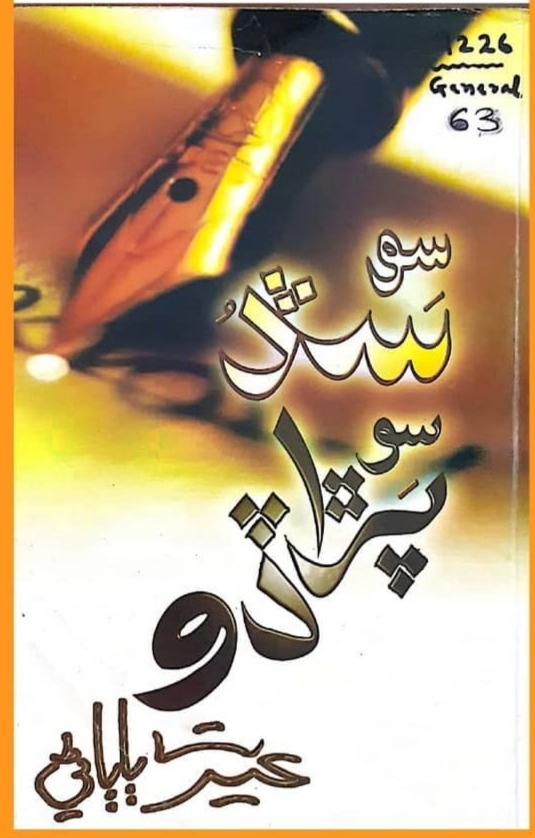 Year 1945 saw holding of a meeting of ‘All Sindh Students’ at Larkana, where Kirat could not garner enough votes to become its General Secretary, as he was blamed for being a Communist activist. Both, Kirat and Dayo Nathani secured 97 votes each, and it was decided to have a sort of lottery to break this impasse. The lottery threw out the name of Kirat Babani and he was chosen as the Union General Secretary. Same year, Kirat represented the Sindh delegation at the meet of ‘All India Students’ Federation’ at New Delhi. Later on, when Aruna Asif Ali visited Sindh, she was also assisted by Kirat Babani for a week during her Sindh tour. Sobho Gyanchandani had initiated ‘Adabi Class’ at Karachi, where writers belonging to leftist leanings would meet once a week. The other prominent leaders of that ‘Adabi Class’ were Shaikh Ayaz, Gobind Malhi, Narayan Shyam, Anand Golani, Sugan Ahuja, Shaikh Raaz, Gobind Punjabi, Krishin Khatwani, Ram Amarlal Panjwani, Lachhman Rajpal, Gul Asnani and Bhagwan Lalwani etc. Kirat’s first story ‘Jilebyun jo Chor’ was also published in ‘Nai Dunya’ during those days. The magazine was edited by Gobind Malhi.
Year 1945 saw holding of a meeting of ‘All Sindh Students’ at Larkana, where Kirat could not garner enough votes to become its General Secretary, as he was blamed for being a Communist activist. Both, Kirat and Dayo Nathani secured 97 votes each, and it was decided to have a sort of lottery to break this impasse. The lottery threw out the name of Kirat Babani and he was chosen as the Union General Secretary. Same year, Kirat represented the Sindh delegation at the meet of ‘All India Students’ Federation’ at New Delhi. Later on, when Aruna Asif Ali visited Sindh, she was also assisted by Kirat Babani for a week during her Sindh tour. Sobho Gyanchandani had initiated ‘Adabi Class’ at Karachi, where writers belonging to leftist leanings would meet once a week. The other prominent leaders of that ‘Adabi Class’ were Shaikh Ayaz, Gobind Malhi, Narayan Shyam, Anand Golani, Sugan Ahuja, Shaikh Raaz, Gobind Punjabi, Krishin Khatwani, Ram Amarlal Panjwani, Lachhman Rajpal, Gul Asnani and Bhagwan Lalwani etc. Kirat’s first story ‘Jilebyun jo Chor’ was also published in ‘Nai Dunya’ during those days. The magazine was edited by Gobind Malhi.
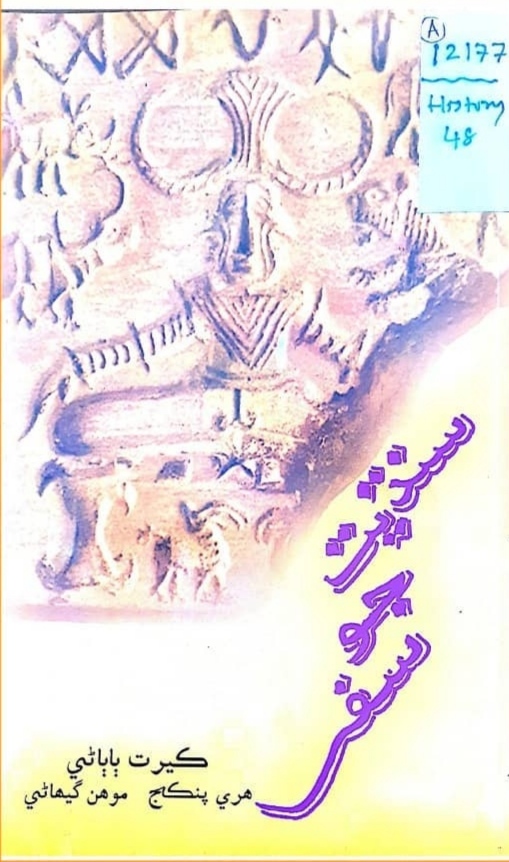 The independence of India came with the division into two countries, which saw large scale migrations of people from one part to another. The division also saw world’s worst riots, killings and mayhem witnessed anywhere, though Sindh was somewhat free from it. But the entry of Indian Muslims into Sindh saw a fresh wave of violence unleashed by them to create a sense of insecurity among Sindhi Hindus. On 6th January, 1948, Mohajirs initiated concerted attacks on Hindu neighborhoods into Karachi.
The independence of India came with the division into two countries, which saw large scale migrations of people from one part to another. The division also saw world’s worst riots, killings and mayhem witnessed anywhere, though Sindh was somewhat free from it. But the entry of Indian Muslims into Sindh saw a fresh wave of violence unleashed by them to create a sense of insecurity among Sindhi Hindus. On 6th January, 1948, Mohajirs initiated concerted attacks on Hindu neighborhoods into Karachi.
Kirat Babani was once again put behind the bars for eleven months. After that, he was freed on the condition that he would leave Karachi within twenty four hours. He proceeded to a noted peasant leader, Hyder Bux Jatoi of Hyderabad and was immediately given a job at ‘Hari Haqdar’ printing press. Hyder Bux Jatoi was pressurized for harboring an atheist communist, which compelled former to advise latter for a visit to India at least for few months. Kirat Babani had to proceed on a voyage on the deck of a ship from Karachi to Bombay in 1949. He reached Bombay on 8th May, 1949 and had just seventeen rupees and eight annas in his pocket. He took refuge in the home of Mohan Punjabi at Bombay for two days. Later, he took admission into Ismail Yousuf College, Jogeshwari, for B.A., so that he could get admission into college hostel. Dr. Choithram Gidwani had chipped in for his college fees. After completion of his B.A., he had also passed LLB.
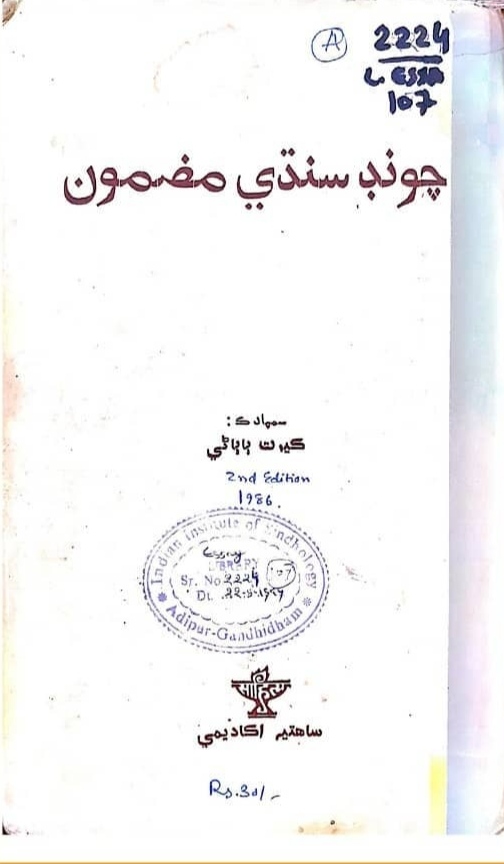 Suddenly Indian Government issued a circular on 9th March 1950, which changed the script of Sindhi language from Persio- Arabic to Devnagari. To add insult to injury, newly placed Indian Constitution also did not have place for Sindhi language. Sindhi writers had to sit up and take notice of both these injustices heaped on the Sindhis of India. A committee, named ‘Sindhi Boli and Lipi Committee’ was constituted whose president was Lekhraj Aziz, Dharamdas Kshatrya as treasurer and Kirat Babani as its secretary. The committee sought legal help from noted lawyer Ram Jethmalani, who immediately shot a letter to then education minister Abul Kalam Azad and challenged the legality of the government order. Indian government realized its mistake and rectified it with another circular issued on 10th January, 1951, which regularized Persian-Arabic and Devnagari, both scripts for Sindhi language and choice of any option was left with the parents of the pupil.
Suddenly Indian Government issued a circular on 9th March 1950, which changed the script of Sindhi language from Persio- Arabic to Devnagari. To add insult to injury, newly placed Indian Constitution also did not have place for Sindhi language. Sindhi writers had to sit up and take notice of both these injustices heaped on the Sindhis of India. A committee, named ‘Sindhi Boli and Lipi Committee’ was constituted whose president was Lekhraj Aziz, Dharamdas Kshatrya as treasurer and Kirat Babani as its secretary. The committee sought legal help from noted lawyer Ram Jethmalani, who immediately shot a letter to then education minister Abul Kalam Azad and challenged the legality of the government order. Indian government realized its mistake and rectified it with another circular issued on 10th January, 1951, which regularized Persian-Arabic and Devnagari, both scripts for Sindhi language and choice of any option was left with the parents of the pupil.
‘Adabi Class’ gave way to ‘Naon Sahat Mandal’, which was later on renamed as ‘Sindhi Sahat Mandal’. Mangharam Malkani was chosen as its president and Gobind Malhi as secretary, Kirat Babani had to abandon Communist Party and join agitation to save Sindhi language and Sindhiat. ‘Sindhi Sahat Mandal’ provided appropriate platform to budding Sindhi litterateurs, which saw many Sindhi creations taking shape, enriching Sindhi literature immensely. Initially Bhojraj Nagrani had agitated for the recognition of Sindhi language into Indian Constitution. A ‘Boli Sabha’ was constituted for the purpose whose president was Lalsing Ajwani and Gobind Malhi as its secretary. Under the able leadership of Hashoo Kewalramani, ‘Sindhi Samaj’ Delhi also worked hard in this respect. Various Sindhi sammelans were held after 1951.
Watch Video: Sindhi Sahit Jee Timurti
Meanwhile Kirat was married to Savita and the agitation for ‘Sindhiat’ continued unabated. A ‘Sindhi Boli Convention’ was held in December 1957, at New Delhi. Kirat Babani always stood in the forefront for recognition of Sindhi language. At last, after a long process of agitations and particularly the efforts of Dada Jairamdas Daulatram, whom the then Prime Minister of India, Indira Gandhi was giving lot of respect bore fruit and Indira Gandhi acquiesced to their request and the Sindhi language was included into the VIII Schedule of the Constitution of India on 10th April, 1967.
‘Akhil Bharat Sindhi Sahat Sammelan’ was held at K.C. College, Bombay in December 1972, where Kirat Babani was elected as president of ‘Akhil Bharat Sindhi Boli Ain Sahat Sabha’, unanimously.
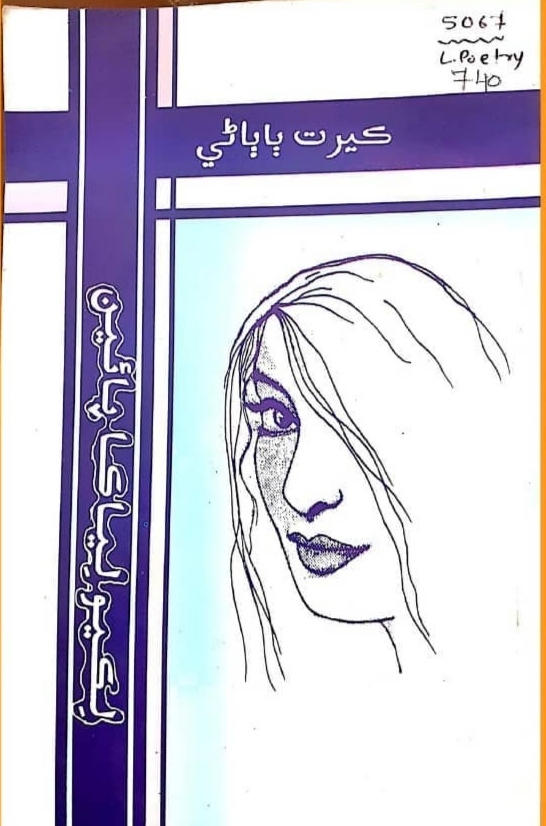 After continuously working for eighteen years as the president of “Akhil Bharat Sindhi Boli and Sahat Sabha”, Kirat Babani decided to step down from the post of presidency, owing to his falling health. He announced it at ‘Sindhi Sahit Sammelan’ held in June in the same year of 1997 at Jaipur, and proposed the name of Mr. Sunder Agnani. The then general body unanimously elected Sunder Agnani, in place of Kirat Babani as Sabha’s president.
After continuously working for eighteen years as the president of “Akhil Bharat Sindhi Boli and Sahat Sabha”, Kirat Babani decided to step down from the post of presidency, owing to his falling health. He announced it at ‘Sindhi Sahit Sammelan’ held in June in the same year of 1997 at Jaipur, and proposed the name of Mr. Sunder Agnani. The then general body unanimously elected Sunder Agnani, in place of Kirat Babani as Sabha’s president.
Kirat Babani has visited Russia in 1981 at the invitation of Govt. of U.S.S.R. and Czechoslovakia in 1983, which was sponsored by World Peace Council. He has also visited U.S.A. at the invitation of International Sindhi Conference.
He was a member, Advisory Board of Sindhi language Sahitya Academy, Ministry of HRD, Govt. of India.
Literary Contribution
Kirat Babani authored 15 books and translated 2 novels & History of Marathi literature. The most significant amongst them are:
- Hooa (She) short stories, 1956.
- Sooree a Saad Kayo, (Call of Gallows), Collection of 8 one Act Plays, 1972.
- Jeki Ditho Ho Moon, (Whatever I had Seen) Travelogue, 1981.
- Abol Rani (Queen who would not speak) Sindhi Folk tales 1982
- Ahween Sab Nanga Ahiyo, (All of you are nude), Short Stories, 1987.
- Kujh Budhayum Kujh Likayum (Narrated some, hidden some), Autobiography in 4 parts, 1993.
- Likyo Liyaka Paeen, (Peeing secretly), Poetry, 2000.
Translation: Significant amongst three was History of Marathi literature by Kusumawati Despande and M.V. Rajadhyaksha.
As Journalist:
Editor ‘Sindh Rises’ in English and ‘Sind Sujag’ in Sindhi monthly political magazine since 1991
In addition, Kirat also compiled & edited Choond Sindhi Mazmoon (Selected essays), Choond Sindhi Lok Kahinyoon (Selected Sindhi Folk Tales), 1991 which were published by Sahitya Akademy, Ministry of HRD Government of India.
Kirat received number of Awards/ Honors. Given hereunder are a few most significant ones.
- Soviet Land Nehru Peace Award, 1980 for his book on Lenin (At Moscow, USSR)
- Award for Okha Dokha (Literary Analysis), 1982 (At New Delhi by Ministry of Education, Govt. of India).
- Award for Outstanding Literary Contributions, 1986 (At Mumbai by Akhil Bharat Sindhi Boli Ain Sahit Sabha).
- Award for Significant Literary Contributions, 1987 (At Mumbai by Maharashtra State Sindhi Sahit Academy).
- Award for Best Literary Work 1992 (At Calcutta by Bhartiya Bhasha Parishad).
Kirat was man of many images – An orator with an appeal, a crusader for a cause and a writer with an inimitable style and above all a friend in need.
He believes that literature has a purpose. The writer need not be committed to creed but he has a commitment to life and should portray life as honestly as possible.
His achievements were the achievements of Sindhi community. In true sense, he was the pride of Sindhi community.
_____________________
Courtesy: Sindhi Sangat
The article is authored by Dr. Manoharlal B. Matlani. Some additional information has been taken from another page of Sindhi Sangat.
